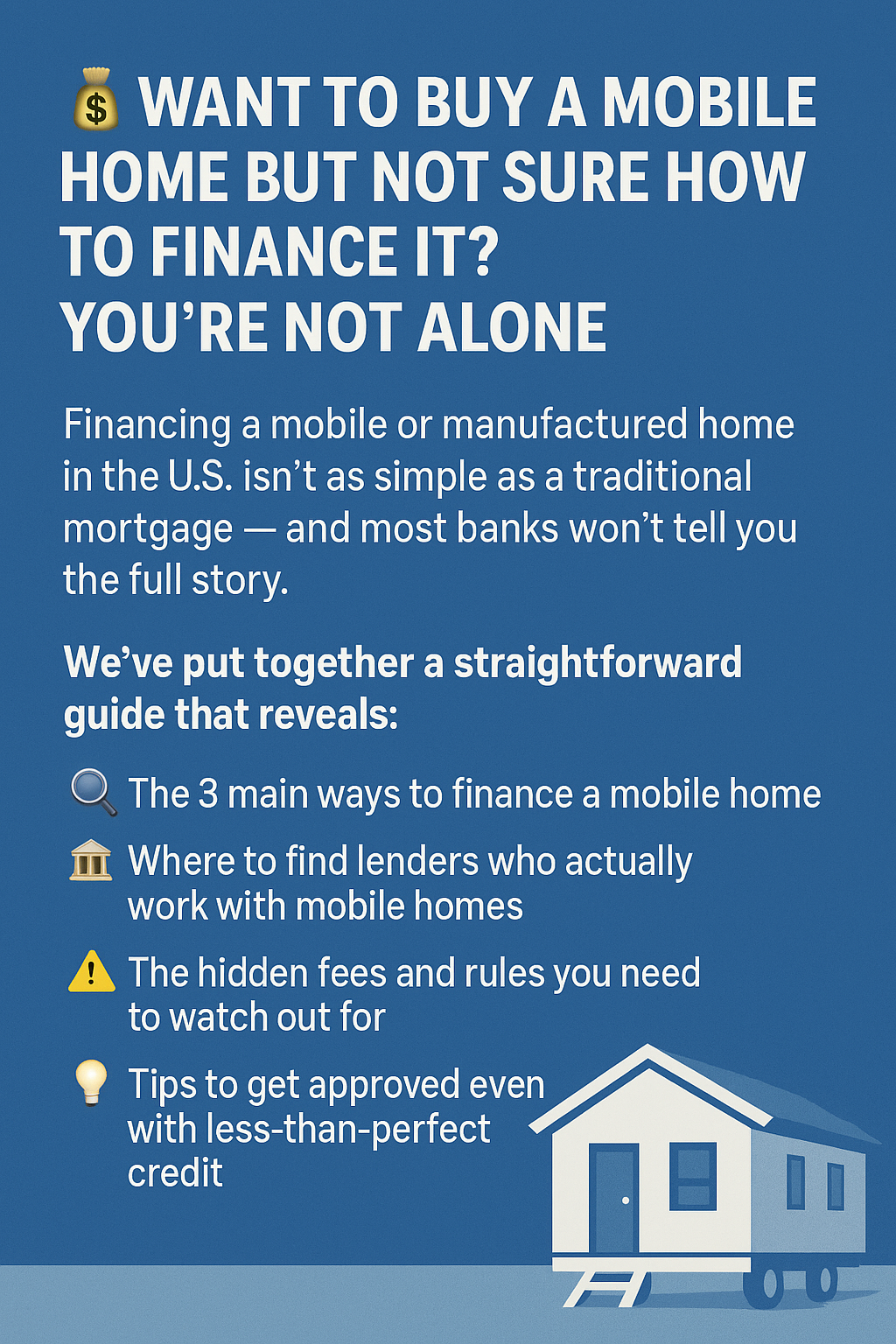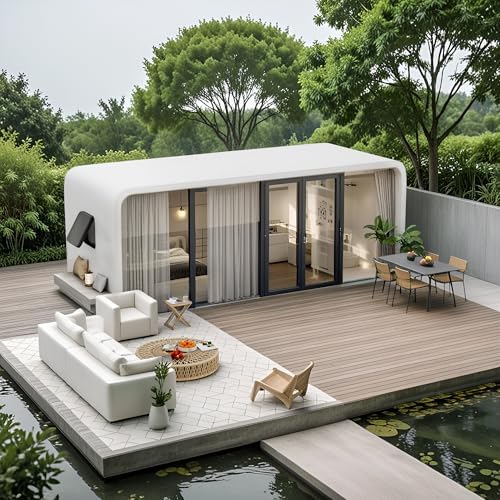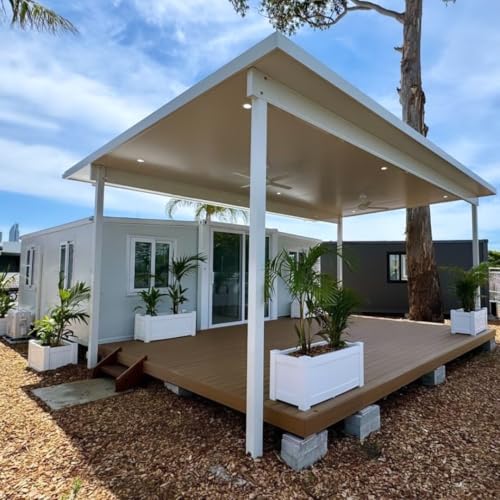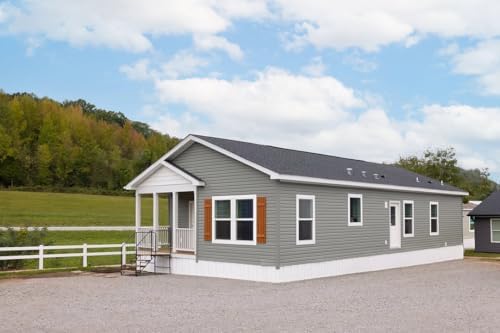Introduction
In recent years, mobile homes have gained traction as a viable alternative housing option for many individuals and families. These prefabricated structures offer unique advantages that cater to a diverse range of lifestyles, often making them an appealing choice for those who seek a more flexible living arrangement. Growing interest in mobile homes can be attributed to their affordability, mobility, and adaptability, which provide homeowners with various options for personalizing their living space.
Mobile homes differ significantly from traditional houses, as they are constructed in a factory and transported to their designated location. This method of construction not only reduces the time it takes to set up a home but also lowers the overall costs associated with homeownership. Furthermore, the average price of mobile homes typically remains lower than that of conventional houses, which is particularly attractive for first-time buyers or those looking to downsize.
However, the decision to live in a mobile home is not without its considerations. While there are undeniable benefits, such as affordability and reduced maintenance, potential drawbacks should also be carefully examined. Issues like limited financing options, potential loss of value over time, and zoning restrictions can significantly influence one’s experience of mobile home living. Additionally, the choice of location is crucial as it can impact overall quality of life and access to community amenities.
This blog post aims to provide a comprehensive overview of mobile homes, discussing their pros, cons, and associated costs in detail. By exploring the various facets of mobile home living, individuals contemplating this transition can make an informed decision that best aligns with their personal needs and financial goals.
Understanding Mobile Homes
Mobile homes, often referred to as manufactured homes, are structures that are constructed on a chassis in a factory setting before being transported to a designated site. Unlike traditional homes, which are built on-site, mobile homes are designed to be relocated; however, they are typically not moved once placed. The term “mobile home” is often used to describe homes built prior to July 1976, when the U.S. Department of Housing and Urban Development (HUD) established federal standards for manufactured housing through the HUD Code. Homes produced after this date are classified as manufactured homes.
It is essential to differentiate between mobile homes, manufactured homes, and modular homes, as each type has distinct characteristics. Mobile homes are built to transport easily, while manufactured homes comply with HUD regulations concerning safety, construction, and energy efficiency. Modular homes, on the other hand, are constructed in sections at a factory and then transported to a site where they are assembled. Unlike mobile and manufactured homes, modular homes typically adhere to the same local building codes as conventional homes, which can enhance their permanence and compliance with regulations.
Mobile homes generally feature a lightweight frame, making them easier to transport, which also contributes to their affordability. These homes offer various layouts, allowing for customization to fit different lifestyles. They typically contain all standard amenities, including kitchens, bathrooms, and living areas, similar to traditional homes. Furthermore, mobile homes are often more affordable than traditional site-built homes, making them an appealing option for first-time buyers or those looking to downsize. Understanding the nature of mobile homes and their differences from other housing types is essential when considering whether such a living arrangement is suitable for one’s needs.
Pros of Living in a Mobile Home
Living in a mobile home presents various advantages that appeal to many individuals and families. One of the most prominent benefits is affordability. Mobile homes are typically less expensive than traditional homes, enabling buyers to save significantly on initial purchase costs. According to the U.S. Census Bureau, the average cost of a mobile home is approximately 50% lower than that of a conventional single-family home. This affordability allows homeowners to allocate funds toward other priorities, such as education or retirement savings.
In addition to lower purchase prices, mobile homes often incur reduced utility costs. Many modern mobile homes come equipped with energy-efficient appliances and insulation systems that help maintain temperature and reduce energy consumption. This efficient design translates into lower monthly utility bills, which can be particularly beneficial for budget-conscious families or retirees living on a fixed income.
The flexibility of location also ranks high among the advantages of mobile home living. Homeowners can choose to place their mobile homes in various locations, whether in a mobile home community or on privately owned land. This flexibility provides the opportunity to live in tranquil rural settings or more vibrant urban areas, depending on personal preferences. Furthermore, moving a mobile home is generally less complicated than relocating a traditional house, offering even greater convenience should life circumstances change.
Community living is another appealing aspect of mobile homes. Many mobile home parks foster a strong sense of community, encouraging social engagements and interactions among residents. This supportive atmosphere can be particularly beneficial to those seeking companionship or assistance. Lastly, mobile homes are often customizable. Many manufacturers provide options for personalization, allowing homeowners to create spaces that reflect their individual styles and needs, enhancing overall satisfaction with their living environment.
Cons of Living in a Mobile Home
While mobile homes can offer affordability and flexibility, there are several disadvantages that individuals should carefully consider before making a significant investment. One major concern regarding mobile home ownership is depreciation. Unlike traditional houses, which often appreciate in value over time, mobile homes tend to lose value rapidly. This can result in a financial loss if the owner wishes to sell the home in the future.
Another factor to consider is potential zoning restrictions. Many municipalities have specific regulations regarding where mobile homes can be located. These restrictions can limit the options for park placement or even prevent placement on private property altogether. In addition, mobile home communities may have their own rules and regulations, which can impact the livability and sense of community.
Maintenance issues also pose a challenge for mobile home residents. While generally less expensive than traditional homes, mobile homes often require ongoing upkeep, especially in areas prone to harsh weather. Owners may need to invest in repairs for roofing, plumbing, and insulation, which can become costly over time. Due to the construction materials used in mobile homes, they may also be more susceptible to wear and tear.
Space limitations are another consideration, as mobile homes typically offer less square footage compared to standard homes. This can affect not only living space but also storage options. Families with multiple members may find mobile homes cramped, particularly when children are involved. Furthermore, the stigma associated with living in mobile home communities can be another downside; some individuals may view these communities as less desirable than traditional neighborhoods, which could impact social interactions and home values.
These factors contribute to a complex decision-making process for those considering mobile home living. Understanding the potential drawbacks alongside the benefits is essential to make an informed choice that aligns with individual circumstances and long-term goals.
Cost Breakdown: What to Expect
Purchasing a mobile home can be an attractive option for many due to a range of financial factors. However, it is important to understand the full scope of the costs involved. The initial costs typically involve the purchase price of the mobile home itself, which can vary significantly based on size, age, and condition. On average, the price of a new mobile home can range from $50,000 to over $100,000, while used models may be available for less. Additionally, potential buyers should expect to incur setup fees, which include costs associated with transportation, installation, and any necessary adjustments to meet local codes and regulations.
Once the mobile home is set up, ongoing expenses will come into play. Monthly payments are often a major consideration, especially for those financing their purchase through loans or mortgages. These payments will typically include both principal and interest, with the overall figure depending on the buyer’s credit score and loan terms. Utilities, such as water, electricity, and gas, represent another ongoing cost that must be budgeted; these expenses can fluctuate based on usage and location, so it is prudent to research average rates in the area. Property insurance is also necessary to protect the investment, with rates varying by provider and coverage options.
Moreover, potential mobile home owners should be aware of hidden costs that can arise in mobile home ownership. If the home is situated on rented land, monthly land rental fees may apply, which can vary significantly depending on the location and amenities. Maintenance costs should not be overlooked either; while mobile homes typically require less upkeep than traditional homes, regular maintenance is essential to preserve value and prevent larger, costlier repairs down the line. This comprehensive understanding of costs is vital for anyone considering whether a mobile home is the right fit for their financial situation.
Financing Options for Mobile Homes
When considering the purchase of a mobile home, understanding the various financing options available is crucial. Mobile homes can be financed through different methods, each with its own set of requirements and benefits. Traditional loans, FHA loans, personal loans, and cash purchases are the primary financing paths potential buyers can explore.
Traditional financing for mobile homes operates similarly to that for site-built houses, but it often comes with specific considerations. Lenders typically require that the mobile home be permanently affixed to a foundation and meet certain standards. Buyers usually need a good credit score, stable income, and a reasonable debt-to-income ratio to qualify for a conventional mortgage on a mobile home. Interest rates and down payment requirements may vary significantly based on the lender’s risk assessment.
The Federal Housing Administration (FHA) offers loans specifically for mobile homes through its Title I program. These loans have more flexible qualification criteria than traditional financing, making them accessible for buyers with lower credit scores. An FHA loan can be used for both new and used mobile homes, allowing for a fixed interest rate and a lower down payment—typically around 3.5% of the purchase price. However, it is essential to note that the home must meet specific requirements to be eligible for FHA financing.
Personal loans represent another option, though they usually come with higher interest rates than mortgages. They’re ideal for buyers without a large down payment or who may not want to use the mobile home as collateral. Instead, individuals may secure a personal loan based on their creditworthiness. For those with sufficient savings, a cash purchase remains the simplest route, providing immediate ownership and removing the complexities associated with financing. Ultimately, exploring each option thoroughly is critical to securing the most favorable financing arrangement for a mobile home purchase.
Choosing the Right Location
When considering the purchase of a mobile home, selecting an appropriate location is paramount to ensuring both comfort and long-term satisfaction. Location can significantly influence various aspects of daily life, including accessibility to local amenities, availability of transportation, the quality of school districts, and community regulations. An ideal location balances these elements to meet the specific needs and preferences of the homeowner.
Access to local amenities, such as grocery stores, healthcare facilities, and entertainment options, greatly enhances the convenience of living in a mobile home. Proximity to essential services can reduce travel time and fuel costs, contributing to a more enjoyable lifestyle. Furthermore, transportation access, including public transportation options and major highways, is crucial, especially for those who commute to work or require regular travel for activities.
Another important consideration is the quality of the schools in the area, particularly for families with children. Researching school districts can provide insight into educational opportunities and resources available to residents. Strong school districts not only impact the immediate educational environment but also contribute to property values, making them desirable for potential homebuyers.
When evaluating the potential location for a mobile home, it is also important to understand community rules and regulations. Different mobile home parks may have specific guidelines regarding lot usage, maintenance responsibilities, and lifestyle expectations. On the other hand, owning land privately can allow for greater freedom in customizing the living space, but it may come with additional responsibilities, such as managing utilities and land upkeep.
In summary, the location of a mobile home plays an essential role in the overall satisfaction of living experience. Careful consideration of local amenities, transportation access, school districts, and community regulations will aid prospective mobile homeowners in making an informed choice. Proper evaluation of these factors can lead to a fulfilling and stable living environment.
Mobile Home Living: Lifestyle Considerations
Choosing to live in a mobile home involves various lifestyle considerations that can significantly impact an individual’s or family’s day-to-day existence. One key aspect is the sense of community that often accompanies mobile home living. Many mobile home parks foster tight-knit environments where residents share common spaces and experiences, promoting social interactions and a sense of belonging. This community aspect can be especially beneficial for families or individuals seeking companionship and support.
When assessing the implications of mobile home living, it is crucial to consider the environmental factors that may come into play. Mobile homes are often viewed as more sustainable housing options compared to traditional homes due to their smaller size and lower resource consumption. Additionally, many mobile home parks are situated in serene, natural environments, providing residents with access to recreational activities and a connection to nature that can enhance overall well-being.
Family dynamics may also be impacted by the choice to live in a mobile home. For families looking to downsize or simplify their lives, mobile homes offer manageable spaces that can foster closer relationships. On the other hand, it is important to recognize that the minimalistic lifestyle associated with mobile home living may not suit everyone, particularly those accustomed to larger living spaces or seeking a more expansive lifestyle.
Individuals should reflect on their personal needs and goals when considering mobile home living. Questions regarding space requirements, proximity to work or schools, and the desire for community interaction should be considered. Ultimately, aligning one’s values with the characteristics of mobile home living is essential for a fulfilling experience. By carefully examining these lifestyle implications, potential residents can make informed decisions that align with their aspirations and daily needs.
Conclusion: Is a Mobile Home Right for You?
As we have explored throughout this blog post, the decision to invest in a mobile home involves numerous considerations, balancing both advantages and disadvantages. Mobile homes can provide an affordable entry into homeownership, offering flexibility that traditional housing may not. However, they also come with unique challenges such as depreciation, maintenance concerns, and potential zoning restrictions.
It is important for prospective buyers to reflect on their personal situations and priorities. Here are a few key questions to ponder before making a decision:
- What is your budget for homeownership, including initial costs and ongoing maintenance?
- Do you value mobility, or are you looking for a permanent residence?
- How do the associated costs of a mobile home compare to your other housing options, such as traditional homes or rentals?
- Are you prepared to navigate any zoning laws and community restrictions that may apply to mobile homes in your desired area?
- What are your long-term plans concerning home investment and property appreciation?
Taking the time to answer these questions can provide clarity on whether a mobile home aligns with your long-term goals and lifestyle. Additionally, it may be beneficial to speak with current mobile home owners or financial advisors who can offer insight and advice tailored to your unique situation.
Ultimately, the choice to pursue a mobile home should not be made hastily. Evaluating both the pros and cons and considering your personal circumstances will help ensure that you make an informed decision that best suits your needs and aspirations. A mobile home could indeed be the right fit for you, provided it aligns with your living preferences and financial objectives.




